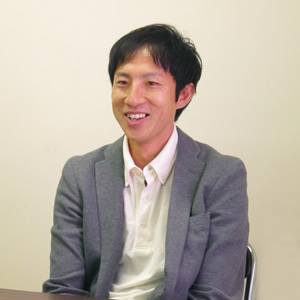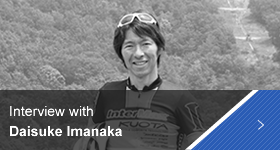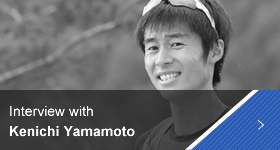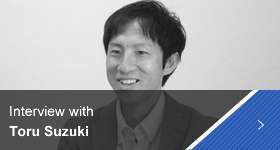Main content starts here.
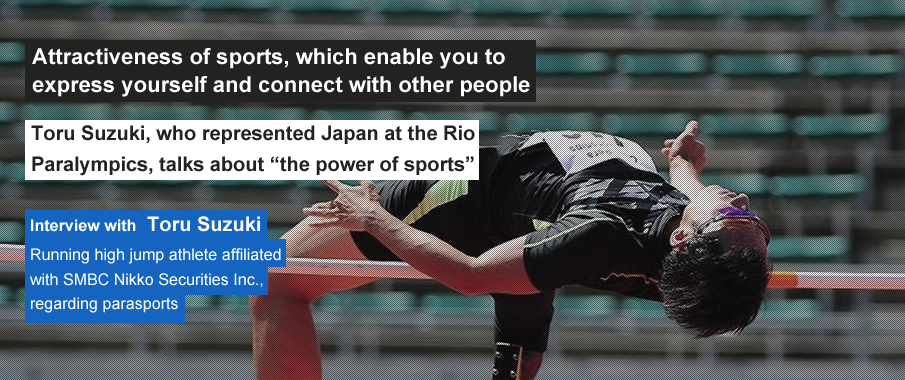
Sports at center of life since childhood
Please tell us about yourself. What kind of child were you?
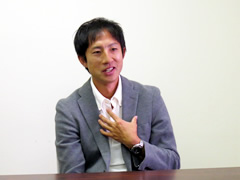 I was born and raised in Yamanashi City, and I come from a farm family, so even when I was little was always running around in nature. I really loved sports, and started swimming at the age of 5. When I was an elementary school student, I continued swimming and also started baseball and basketball. Sports were at the center of my life.
I was born and raised in Yamanashi City, and I come from a farm family, so even when I was little was always running around in nature. I really loved sports, and started swimming at the age of 5. When I was an elementary school student, I continued swimming and also started baseball and basketball. Sports were at the center of my life.
In high school, I was active at the national level as a handball player.
Handball was popular in the Higashiyamanashi District (currently Yamanashi City and Koshu City), and I thought it looked interesting when I observed a junior high school club playing it, so I started. Everything about this sport was fun, so I became immersed in it in junior and senior high school. I was aiming to represent Japan as a handball player, so I practiced it a lot in those days.
When you were in your third year of high school and were hoping to become more active as a handball player, you were in a traffic accident, and your leg was amputated. Apparently you encountered the running high jump when you were undergoing rehabilitation at that time.
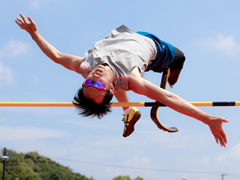 I was hoping to play handball once more even though I had lost my right leg, so I started rehabilitation so that I could first of all gain the ability to run again. I was able to run again a year later, but it took me 20 seconds to run 100 m. One day as I was continuing my rehabilitation, the equipment and mat for the high jump that people had been using for practice was left out. I tried jumping just for fun, and I immediately succeeded in jumping 1 m 50 cm, which was the Japanese record at that time. I had already been good at jumping, and when I was in my third year of junior high school, I set a running high jump record of 1 m 76 cm, so I thought I could probably jump 1 m 70 cm. But I got stuck at 1 m 65 cm. Nevertheless, the moment I jumped the Japanese record, I thought, “This is it.” I then decided to aim to represent Japan in the running high jump.
I was hoping to play handball once more even though I had lost my right leg, so I started rehabilitation so that I could first of all gain the ability to run again. I was able to run again a year later, but it took me 20 seconds to run 100 m. One day as I was continuing my rehabilitation, the equipment and mat for the high jump that people had been using for practice was left out. I tried jumping just for fun, and I immediately succeeded in jumping 1 m 50 cm, which was the Japanese record at that time. I had already been good at jumping, and when I was in my third year of junior high school, I set a running high jump record of 1 m 76 cm, so I thought I could probably jump 1 m 70 cm. But I got stuck at 1 m 65 cm. Nevertheless, the moment I jumped the Japanese record, I thought, “This is it.” I then decided to aim to represent Japan in the running high jump.
Running high jump is an event without a finish line, and this is what makes it interesting.
What made you want to represent Japan in the running high jump?
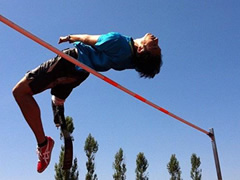 Ever since elementary school, I had wanted to compete in sports for Japan. When I was little, I loved professional baseball, J.League, the NBA, and so on, because sports athletes played these. When I started handball in junior high school, I set a goal of representing Japan in handball. But I wasn’t particular about how I wanted to represent Japan. I also liked sports based on jumping, so for me, there wasn’t a huge difference between handball and the high jump. When I encountered the running high jump, I set a new goal of representing Japan in this event.
Ever since elementary school, I had wanted to compete in sports for Japan. When I was little, I loved professional baseball, J.League, the NBA, and so on, because sports athletes played these. When I started handball in junior high school, I set a goal of representing Japan in handball. But I wasn’t particular about how I wanted to represent Japan. I also liked sports based on jumping, so for me, there wasn’t a huge difference between handball and the high jump. When I encountered the running high jump, I set a new goal of representing Japan in this event.
What do you find attractive and interesting about the running high jump?
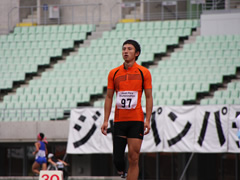 I think it is the difficulty and profundity of 1 cm. You cannot jump well unless every element goes just right, including the speed of your approach run and the timing of your jumping step. I think this is interesting. Also, the running high jump is a cruel sport (laughs). Even if you set a new personal record or win, you always end the competition with a failed attempt, so this sport always finishes with an unpleasant feeling. Even if you set a record, this is not the finish line. You always continue to aim for a better result. This is an individual event, so you are responsible for all of the results yourself, whether good or bad. I think this is an attractive aspect. I am my 17th year of doing the running high jump, and my love for this event only gets stronger.
I think it is the difficulty and profundity of 1 cm. You cannot jump well unless every element goes just right, including the speed of your approach run and the timing of your jumping step. I think this is interesting. Also, the running high jump is a cruel sport (laughs). Even if you set a new personal record or win, you always end the competition with a failed attempt, so this sport always finishes with an unpleasant feeling. Even if you set a record, this is not the finish line. You always continue to aim for a better result. This is an individual event, so you are responsible for all of the results yourself, whether good or bad. I think this is an attractive aspect. I am my 17th year of doing the running high jump, and my love for this event only gets stronger.
What you need in order to start something new is the courage to take the first step.
In regard to your accomplishments, you were the first Japanese person to participate in the Paralympic games in the running high jump, and won awards at the Paralympic games five times in a row. What have you gained and felt through the Paralympic games?
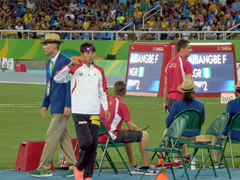 For me, the Paralympic games is a special competition. Various dramas have taken place involving intense pressure, hope, joy, and sorrow, and stories have unfolded that are unique to the Paralympic games, including injuries and slumps. In addition to the competition aspect, I have had many truly valuable experiences at the Paralympic games, including connecting with other people and experiencing foreign countries. I would have not gained these experiences if I didn’t compete there.
For me, the Paralympic games is a special competition. Various dramas have taken place involving intense pressure, hope, joy, and sorrow, and stories have unfolded that are unique to the Paralympic games, including injuries and slumps. In addition to the competition aspect, I have had many truly valuable experiences at the Paralympic games, including connecting with other people and experiencing foreign countries. I would have not gained these experiences if I didn’t compete there.
It seems that sports have given you many experiences.
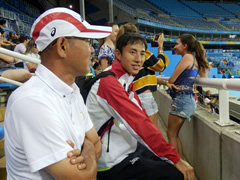 Actually when I was 5 years old, I was suffering from stuttering, so in elementary school I stopped speaking because I didn’t like being teased. I couldn’t speak very well and wasn’t very lively, so the way I expressed myself was through sports. When I was moving around, I would be praised for my skill, and being able to please people around me made me very happy. I was able to express myself and connect with others, and age, gender, and disabilities were irrelevant. I think this is what is especially attractive about sports.
Actually when I was 5 years old, I was suffering from stuttering, so in elementary school I stopped speaking because I didn’t like being teased. I couldn’t speak very well and wasn’t very lively, so the way I expressed myself was through sports. When I was moving around, I would be praised for my skill, and being able to please people around me made me very happy. I was able to express myself and connect with others, and age, gender, and disabilities were irrelevant. I think this is what is especially attractive about sports.
It seems that there are many people who want to engage in sports but are unable to start. What advice would give such people?
 What you need is the courage to take the first step. You need the courage to go outside and the courage to take on the challenge of new things. The most important thing is to have fun. There are few sports teams for persons with disabilities in Yamanashi Prefecture, and there is still not much information about this, but I am hoping that people with disabilities will proactively go outside, exchange information, increase their friends, and enjoy engaging in sports.
What you need is the courage to take the first step. You need the courage to go outside and the courage to take on the challenge of new things. The most important thing is to have fun. There are few sports teams for persons with disabilities in Yamanashi Prefecture, and there is still not much information about this, but I am hoping that people with disabilities will proactively go outside, exchange information, increase their friends, and enjoy engaging in sports.
I want to create a comprehensive-type sports club where everyone can enjoy sports.
What is the best approach to take when interacting with persons with disabilities?
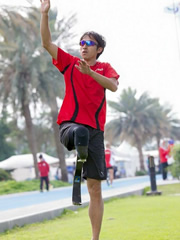 I believe that it depends on the disability, but what I feel is that if someone is out in public alone, they are basically independent, and everyday living is a form of training, so I don’t think that such a person needs much help. It might be good to picture a clothing shop. You say something if you need assistance. Also, facilities are well equipped, and what is important is how the equipment is used. If non-disabled people use the restroom for disabled people, and disabled people cannot use it, then it is meaningless. It is a matter of making the equipment provided easier for disabled people to use. I think the most important thing is spirit of mutual consideration.
I believe that it depends on the disability, but what I feel is that if someone is out in public alone, they are basically independent, and everyday living is a form of training, so I don’t think that such a person needs much help. It might be good to picture a clothing shop. You say something if you need assistance. Also, facilities are well equipped, and what is important is how the equipment is used. If non-disabled people use the restroom for disabled people, and disabled people cannot use it, then it is meaningless. It is a matter of making the equipment provided easier for disabled people to use. I think the most important thing is spirit of mutual consideration.
What is your goal for the future?
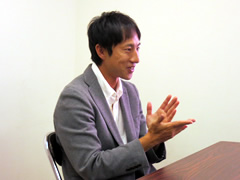 My number one goal is participating in the Tokyo Paralympic games and winning a medal. There are no limits regarding the technique of the running high jump, so athletes can continue to jump higher and higher. That is why I will not retire. I will continue to work hard and aim to jump higher. My dream is to create a comprehensive-type sports club where both non-disabled persons and disabled persons can enjoy sports. Children of today have become polarized into those who can do sports and those who can’t. This is simply a matter of whether or not they have participated in sports. There is a high level of specialization, so there are children who are outstanding at soccer but cannot play other sports at all. When I was in elementary school, I experienced a variety of sports, so even after I became disabled, I was able to play the sports that I had experienced without any difficulty. I intend to create and support a club where people of the younger generation can enjoy a variety of sports.
My number one goal is participating in the Tokyo Paralympic games and winning a medal. There are no limits regarding the technique of the running high jump, so athletes can continue to jump higher and higher. That is why I will not retire. I will continue to work hard and aim to jump higher. My dream is to create a comprehensive-type sports club where both non-disabled persons and disabled persons can enjoy sports. Children of today have become polarized into those who can do sports and those who can’t. This is simply a matter of whether or not they have participated in sports. There is a high level of specialization, so there are children who are outstanding at soccer but cannot play other sports at all. When I was in elementary school, I experienced a variety of sports, so even after I became disabled, I was able to play the sports that I had experienced without any difficulty. I intend to create and support a club where people of the younger generation can enjoy a variety of sports.
Toru Suzuki profile
Mr. Suzuki was born in 1980 in Yamanashi City, Yamanashi Prefecture. He was affiliated with the handball club in his junior and senior high school days, and was active as a player on the national level. In his third year of high school, his right leg was amputated as the result of a traffic accident. He encountered the running high jump while undergoing rehabilitation, and became the first Japanese person to participate in the Paralympic games in the running high jump event. He subsequently achieved good results at numerous international competitions, and has won awards at five consecutive Paralympics: Sydney, Athens, Beijing, London, and Rio de Janeiro. For five years starting in 2009, Mr. Suzuki served as the coach of the handball club at Surugadai University, and he proactively gives lectures related to his experience at schools, companies, and so on throughout Japan.
